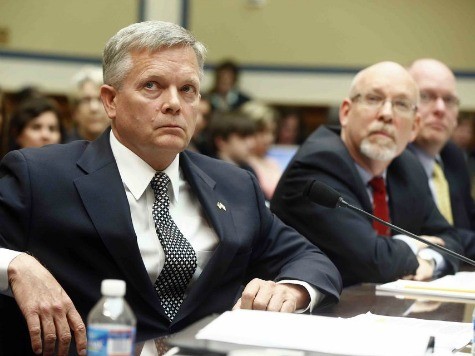
Representatives Frank Wolf (R-VA), Steve Stockman (R-TX), and Darryl Issa (R-CA) have each claimed witnesses who planned to testify about the attack on American citizens in Benghazi, Libya have suffered repeated roadblocks in the way of providing such testimony.
Those witnesses have reportedly been forced to sign non-disclosure agreements (NDA’s), intimidated, and witnesses’ lawyers could not gain clearance to properly represent their clients given the sensitive information the witnesses have.
Wolf said on the House floor:
According to trusted sources that have contacted my office, many, if not all, of the survivors of the Benghazi attacks – along with others at the Department of Defense and CIA – have been asked or directed to sign additional Non-Disclosure Agreements about their involvement in the Benghazi attacks
Wolf continued, “Some of these ‘new’ NDAs, as they call them, I have been told, were signed as recently as this summer.”
A State Department official told Wolf last week that no State Department employee was forced to sign an NDA relating to the events in Benghazi and claimed to “consistently communicate” that any State employee who wants to share their personal accounts with the Accountability Review Board (ARB) or Congress may do so. The official also offered further assistance to Wolf.
Wolf, calling out the State Department’s claim of being “helpful,” sent a letter back to Secretary of State John Kerry asking again for the contact information of five particular State Department employees who were successfully evacuated from Benghazi.
“All government employees have to sign NDA’s for various legitimate purposes, such as protecting classified information and other various legitimate secrecy restrictions from unrestrained free speech,” Tom Devine, Legal Director of the Washington, D.C. based legal watch group Government Accountability Project (GAP), told Breitbart News.
“The problem is when those NDA’s cross the line in they are a vehicle to cover up government misconduct or information that the public has the right to know. There’s really no valid public policy base.”
Devine says the government periodically has tried to create a blanket prior restraint through sweeping unrestricted NDA’s that would trump rights under whistleblower protection laws.
For example, there was an extremely serious campaign to do that during the Reagan administration and it led to a counterattack of those first restrictions of those NDA’s. It’s called the anti-gag statute. It was part of the appropriations law. It’s been in appropriations law every year since 1988. We codified it in the whistleblower protection law.
The anti-gag statute, according to Devine, bans spending to implement or enforce any non-disclosure agreement that does not contain a certain qualifier, otherwise known as an addendum.
“That addendum is incorporated into every non-disclosure agreement the government issue as a matter of law,” said Devine. “What the addendum says is that to the extent that there’s language in the non-disclosure agreement or rule or policy or whatever it is, that contradicts the rights in the Lloyd La Follette Act to communicate with Congress or the whistleblower protection act.” He noted that there is a list of government laws regarding some employees whose free speech rights supercede any contradictory restrictions in the gag order.
“An agency can’t issue a gag order that would cancel free speech rights in the WPA; another is the right to communicate with Congress. An agency cannot lawfully spend money to restrict Congressional communications.”
Devine also explains that one of the statutes in the WPA trumps any conflicting language that requires information be specifically marked before it can be classified.
“That basically says you can’t gag somebody from disclosing unmarked classified information, because legally there is no such thing under the anti-gag statute.”
The government does not always respect that and continues to prosecute people for disclosing information that they say, after the fact, was classified despite it never being marked as such, Devine notes. GAP, the organization that helped create the Whistle Blower Protection Act, classified gag orders as personnel actions–the same way firing someone or demoting them is a personnel action.
“The Whistleblower Protection Enhancement Act basically duplicates that addendum in the anti-gag statute,” Devine said. “It’s an unpermitted personnel practice for any non-disclosure agreement to contradict or undermine the rights of the following laws and that covers all the communications with Congress — all the laws defining the limits and boundaries for what properly classifies information.”

COMMENTS
Please let us know if you're having issues with commenting.